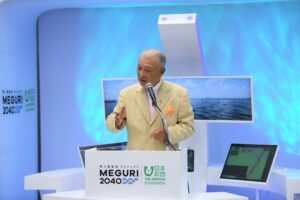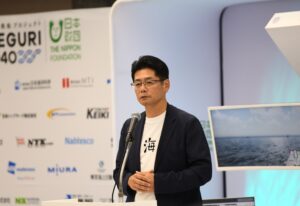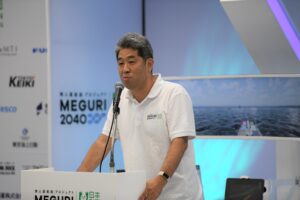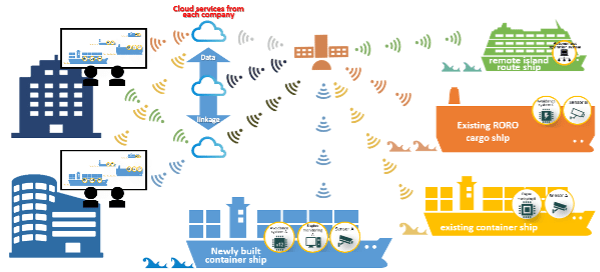News & Press Release
Participating in the Second Stage of the Nippon Foundation MEGURI2040 Fully Autonomous Ship Project for Social Implementation
Shipping >We will participate in the Joint Technological Development Program for the Demonstration of Fully Autonomous Ships under the MEGURI 2040 Fully Autonomous Ship Project* (hereinafter MEGURI2040) administrated by the Nippon Foundation, as a member of the Designing the Future of Fully Autonomous Ships Plus consortium (hereinafter DFFAS+),** which comprises 51 companies based in Japan.
On July 20, the Nippon Foundation held a seminar*** on the MEGURI2040. At the seminar, an overview of the second stage of MEGURI2040 and the project's initiatives were presented.
This program is positioned as the second stage of MEGURI2040, which started in 2020, and aims for full-scale commercialization of fully autonomous ship technology by 2025, which was developed in the "Joint Technological Development Program for Demonstration of Fully Autonomous Ship," which was carried out as the first stage, in cooperation with the Nippon Foundation.
Program Overview
The program will aim for full-scale commercialization of fully autonomous ships technology by 2025, with four goals.
- Demonstration test
In addition to designing next-generation ships that will support the coastal shipping industry in the future, a demonstration of ship-land operations will be conducted to simulate the future coastal shipping industry that will be supported by fully autonomous ships. The demonstration will use four different types of ships (a newly built full package container ship; with a fully autonomous navigation function, an existing container ship, a RORO cargo ship and a remote island route ship; with some autonomous navigation function) and two Fleet Operation Centers. - Standardization of developed technologies
To refine the fully autonomous ships technology developed in the first stage, and by standardizing these technologies into international standards, to strengthen Japan's maritime industry and lead the international competition in fully autonomous ships technology. - Reinforcement of development process infrastructure
Based on the development process infrastructure established in the first stage, reinforce it further by upgrading simulation technology, generalizing risk assessment, etc. - Social Implementation
To commercialize an autonomous navigation function (including a land-based monitoring function) and to establish a certification scheme necessary to commercialize the function.
In addition, to improve the environment for social implementation, we will utilize our knowledge of technological development to establish international and domestic rules for fully autonomous ships, examine human resource requirements and training methods to accommodate new working styles, study the use of deregulation and other methods to ensure the continuous commercial use of fully autonomous ships, and examine insurance and freight rates for fully autonomous ships.
Our Approach
We participated in the first stage of MEGURI2040 of the DFFAS Consortium, the predecessor of DFFAS+, and will continue to participate in the DFFAS+ in the second stage of MEGURI2040.
In the first stage, we developed a "route planning system" in which AI recommends optimal routes, and supported autonomous vessel operation at the onshore support center.
In the second stage, under extreme weather conditions in recent years, we will develop the weather risk management infrastructure for autonomous ship ships, taking into account not only en route weather effects but also on arrival and during cargo operations.
In order to solve social issues in Japan's coastal shipping industry, such as reducing labour shortages and workloads, preventing maritime accidents, and maintaining remote island shipping routes, and to support stable domestic logistics and transportation infrastructure, the Nippon Foundation, DFFAS+ participating companies, and domestic and international partner organizations will continue to work together toward the commercialization of fully autonomous ships by 2025.
* A subsidization scheme to cultivate further momentum for technological development in the field of crewless maritime autonomous surface ships, promoting changes in logistics, economies, and social infrastructure in Japan, and supporting such technological development through the success of the world's first crewless autonomous operation trials by domestic coastal vessels.
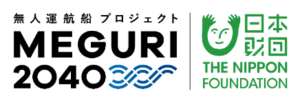

** Companies participating in the DFFAS+ project include Japan Marine Science Inc. (project leader); Akasaka Diesels Limited; IKOUS Corporation; Imoto Lines,Ltd.; Weathernews Inc.; Uyeno Transtech Ltd; EIZO Corporation; SK WINCH CO.,LTD.; MTI Co., Ltd.; NX Shipping Co.,Ltd.; NTT Communications Corporation; Kawasaki Kisen Kaisha, Ltd.; KAWASAKI KINKAI KISEN KAISHA,LTD.; KANDA DOCKYARD Co., Ltd.; KYOKUYO SHIPYARD CORPORATION; Kinkai Yusen Kaisha Ltd.; Kokusai Ryobi Ferry Co.,Ltd.; Sunflame Co., Ltd.; Sanwa Dock Co., Ltd.; JRCS Co.Ltd.; JAPAN HAMWORTHY CO.,LTD.; Japan Marine United Corporation; Mitsui O.S.K. Lines, Ltd.; SKY Perfect JSAT Corporation.; Suzuyo Marine Co., Ltd.; Space Compass Corporation; TERASAKI ELECTRIC CO.,LTD.; Tokio Marine & Nichido Fire Insurance Co., Ltd.; TOKYO KEIKI INC.; TST CORPORATION.; MIRAI R&D (Research & Development);Nakashima Propeller Co., Ltd.; Nabtesco Corporation; NIHON SHIPYARD CO.,LTD.; Japan Radio Co., Ltd.; NYK Line; The Hanshin Diesel Works, Ltd.; BEMAC Corporation; pluszero, Inc.; FUJIWARA SHIPBUILDING CO.LTD.; FURUNO ELECTRIC CO., LTD.; Honda Motor Co., Ltd.; Honda Heavy Industries Co., Ltd.; Marindows Inc.; Marubeni Corporation; MIURA CO.,LTD.; Mitsui E&S Shipbuilding Co., Ltd.; Mitsui Sumitomo Insurance Company, Limited; Mitsubishi Research Institute, Inc.; Mitsubishi Shipbuilding Co., Ltd.; YDK Technologies Co.,Ltd.
*** Presentations on technologies and rules for fully autonomous ships and a panel discussion on expectations and challenges for the commercialization of fully autonomous ships.
The Nippon Foundation Fully Autonomous Ship Project MEGURI2040 Seminar on Fully Autonomous Ship
We promote activities that contribute to the achievement of the SDGs (Sustainable Development Goals) through business activities, and our efforts to utilize digital technology and develop technologies to realize fully autonomous ships will contribute to achieving the following goals.
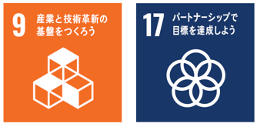
Download text-only version (PDF)
